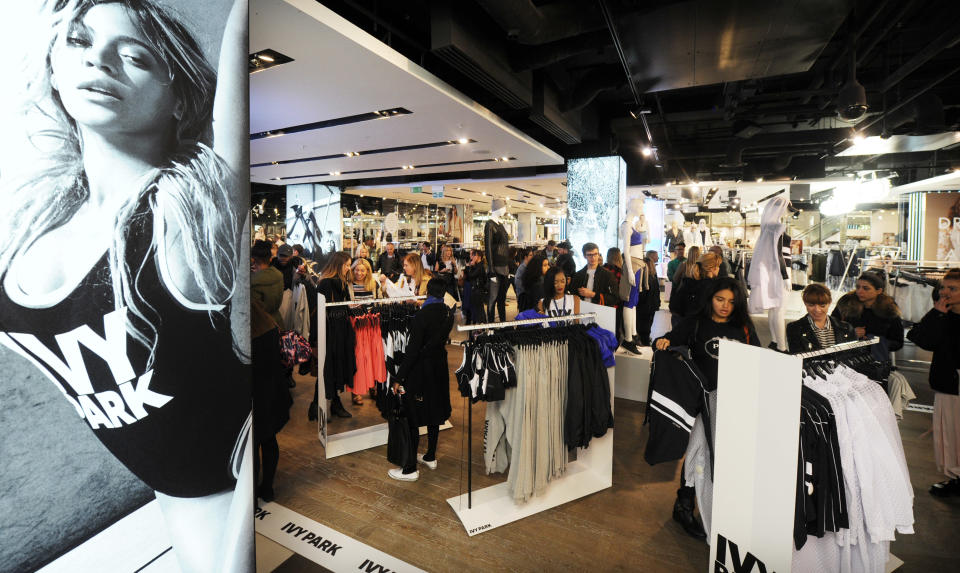Why Beyonce should be very big for Adidas
Adidas is betting on Beyonce.
The German sportswear giant on Thursday announced it has signed Beyonce Knowles as a “creative partner.” The company did not say how much it is paying Beyonce, but the long-term partnership will include designing “new signature footwear and apparel,” as well as relaunching her Ivy Park athleisure brand.
Beyonce bought back TopShop’s 50% stake in Ivy Park last year, and will retain full ownership of the label even as Adidas relaunches it.
In a press release, Beyonce called the deal “the partnership of a lifetime for me.”

There is some precedent here for Adidas: Kanye West.
Every year from 2011 to 2015, Adidas’s share of the U.S. footwear market declined. Then it pulled off a comeback in America, mostly on the strength of its Originals line, which includes classic retro sneakers like the Superstar and Stan Smith, as well as Kanye’s Yeezy line. By fall of 2017, Adidas had doubled its U.S. sneaker market share in one year and jumped over Nike’s Jordan Brand.
Adidas first began working with West in 2014, but in 2016 extended him to a long-term partnership including shoe design and a brick-and-mortar presence.
Beyonce’s partnership looks similarly structured. It is also a way for Adidas to compete with Nike in women’s apparel, which Nike has prioritized recently.
Matt Powell, retail analyst with NPD Group, is cautiously bullish on the Beyonce signing. “This one has potential,” he said in a tweet. Powell added in a comment to Yahoo Finance, “Her role will be much broader and deeper than just an endorsement, and her reach is deeper as well. No idea what they are paying, but surely a lot. Not sure the economics work out, but this one will be interesting.”
That’s saying a lot coming from Powell, who has long been skeptical of the “Kanye effect” for Adidas, though when Adidas recently brought the Yeezy line more mass-market, Powell wrote that expanding the line “led to unexpected gains” for Adidas.
Nike, Adidas, and Under Armour all still sign top athletes to endorsement deals, but the wisdom of spending big on such deals has looked more shaky recently. When Uniqlo signed 37-year-old Roger Federer to a 10-year, $300 million endorsement deal last year, it raised many eyebrows.
Instead, sports brands are focusing on celebrities from the music and entertainment world. Nike has signed deals with Drake and with Kevin Hart. Puma Basketball last year signed a deal with Jay Z. Puma is a direct rival of Adidas, and is located just across the river in Herzogenaurach, Germany—and Jay Z is Beyonce’s husband.
Adidas has emphasized its collaborations with non-athlete “creators” like Kanye, Pharrell Williams, Pusha T, and Stella McCartney. The association with those stars has helped make Adidas cool again in America. And Beyonce is bigger than all of them.
In 2019, celebrity design deals may make more sense for sports brands than traditional athlete sponsorships.
Powell recently declared on his NPD blog, “The paid endorser model is simply broken. Consumers have begun to realize how phony these pay-to-wear deals are.” But he also says Puma’s partnership with Rihanna was a rare exception, a celebrity deal that truly boosted the company’s sales.
Adidas and Beyonce should prove to be a similar exception.
—
Daniel Roberts is the sports business writer at Yahoo Finance. He hosts the podcast Sportsbook and the video series Business + Coffee. Follow him on Twitter at @readDanwrite.
Read more:
The athlete endorsement model is broken
Nike’s Colin Kaepernick sponsorship has more reward than risk
Uniqlo is spending big money on Roger Federer
